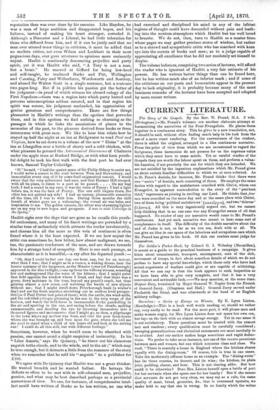CURRENT LITERATURE.
The Story of the Gospels. By the Rev. W. Pound, M.A. 2 vols. (Riviugtons.)—Mr. Pound's volumes are another elaborate attempt at harmonizing the narratives of the Fear Evangelists. He places them together in a continuous story. This he gives in a new translation, not, it should be said, without often finding much help in his task from the use of a more exact rendering. For the convenience of the student,. there is added the original, arranged in a like continuous narrative. From the point of view from which we are accustomed to regard the Scriptures, these harmonies do not possess for us the supreme value which they must have to some minds. Yet as careful studies of the Gospels they are worth the labour spent on them, and perform a valua- ble function, if not precisely the one for which they are intended. We are not satisfied by the ingenious explanations which Mr. Pound gives us about certain familiar difficulties to which we at once referred. As to St. Peter's denials, for instance, Mr. Pound thinks that there were two " series " of denials, each consisting of three. He employs the same device with regard to the malefactors crucified with Christ, whom one Evangelist, in apparent contradiction to the story of the "penitent thief," represents as joining in reviling our Lord. He thinks that four men were crucified on the same day and at the same place with Christ, two of them being 'political malefactors (=not-in/or), and two 'thieves' (Vera:). All this is very ingeniously argued out, but we cannot help thinking that in no one case was any Evangelist aware of all that happened. No reader of any one narrative would come to Mr. Pound's conclusions. And yet each narrative was meant to have some sort of completeness in itself. The difficulty of the doable narrative about the end of Judas is not, as far as we can see, dealt with at all. We can give no idea in our space of the laborious and scrupulous care which Mr. Pound has given to his book. Of this our readers must judge for themselves.






























 Previous page
Previous page